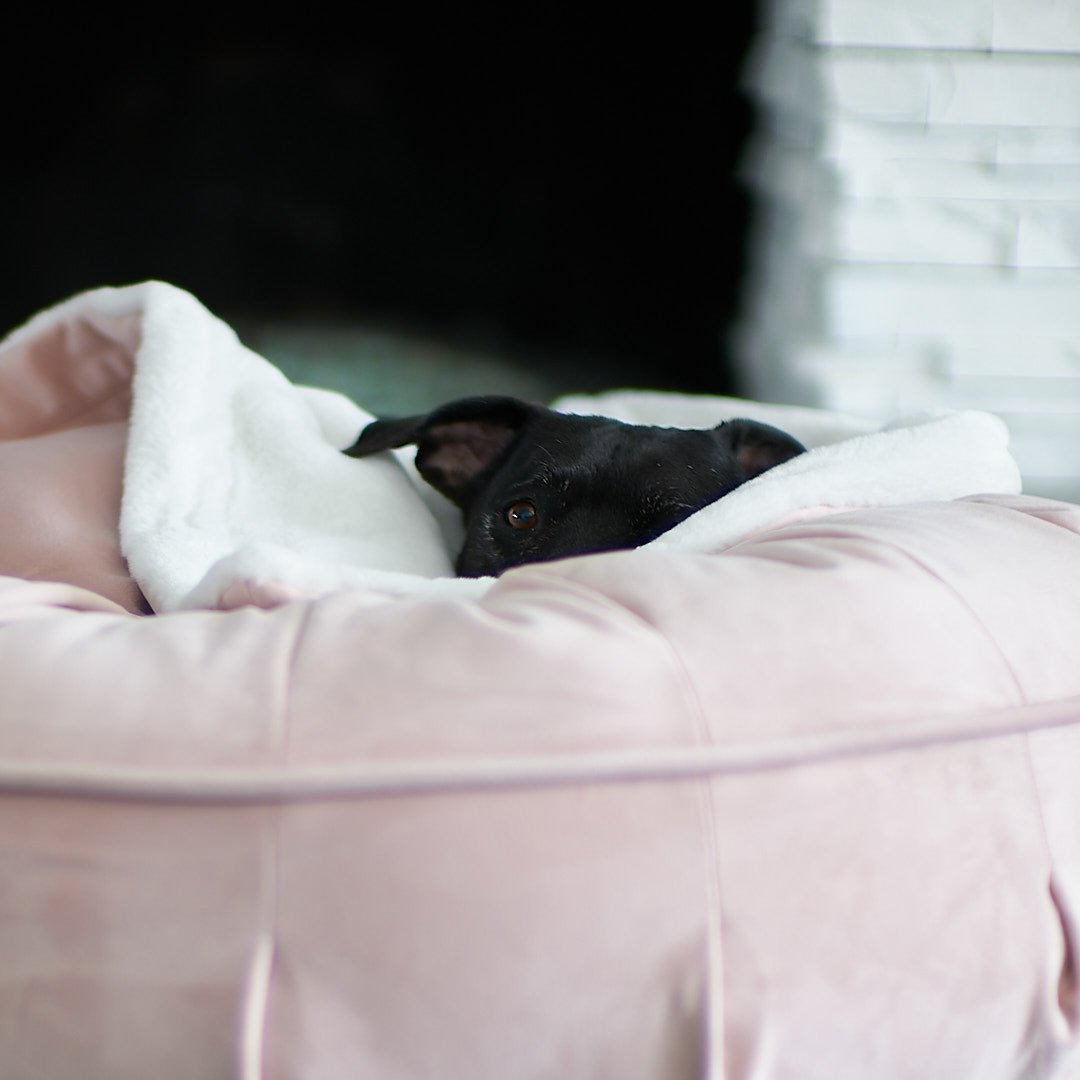Why Won't My Dog Sleep Through The Night

Why Won’t My Dog Sleep at Night?
Sleep is crucial for growth, healing, and maintaining overall wellness for dogs. Plus, a well-rested dog means a happy dog. Typically, dogs sleep 10-12 hours per day, including leisurely naps. But your dog isn’t the only one who needs the right amount of snoozing. A dog with persistent insomnia or sleeping problems can disrupt your sleep as well — causing irritability, exhaustion, and other health issues in both dog and owner.
So, if you’re lying in bed at night pulling your hair out, wondering “why won’t my dog go to sleep?”, you’re not alone. We’ve been there before and we know how stressful it can be, which is why we wrote this article to help both you and your pup get some well-deserved rest. Here are a few reasons why your dog won’t sleep and what you can do about it.
Why Won’t My Dog Sleep At Night?
Canine insomnia can be caused by a variety of factors. Some are minor and easy to fix, and other factors may require more attention. This list compiles some of the more common causes, so browse through and see if one or more of these possible explanations could apply to your pooch.
Anxiety
Just as anxiety in humans can make sleep elusive, anxiety can cause your dog to lose sleep, too.
- This is especially common with new dogs or puppies as they are not used to being alone while sleeping. Puppies are used to being with their mother and siblings, while newly adopted dogs might not be fully adjusted to their new home. If your dog isn’t a puppy nor did you adopt him or her recently, the anxiety might come in the form of separation anxiety.
- Canine anxiety also may be triggered by an unfamiliar scent or new sounds. Dogs can hear higher frequency sounds than humans can, and can hear things from further away. For example, they might hear or smell mice just outside the door, which can give them anxiety about protecting themselves and you.
- If your dog is adopted, it’s hard to know what he or she may have gone through before coming to your safe and loving home. Previous abuse, exposure to the elements, or aggression from other animals can make your dog skittish — especially at night. Being asleep means your dog is not aware of his or her surroundings, and therefore vulnerable. It may be hard for your pup to feel safe enough to let its guard down and fully relax into slumber.
Health Issues
- Not being able to sleep could be a sign of pain or discomfort in your dog’s body. Is your dog excessively licking, behaving strangely, or favoring a leg? Additionally, persistent snoring or choking while asleep could be a sign of sleep apnea.
- It’s normal for older dogs to sleep more often, and trouble sleeping with your long-time friend could be a sign of a health issue. Older dogs are at risk for canine cognitive dysfunction and sundowning behavior. This is a common reality for many elderly canines and is similar to dementia in humans. It can cause confusion in dogs, so normal behaviors like sleep may suddenly become difficult or feel unnatural to them.
- If your dog is on any medication, check to see if insomnia or trouble sleeping is a side effect and consider changing medication or brands.
Distractions
Indoor dogs spend about 80% of the night asleep. But even indoor dogs are exposed to stimulation such as loud traffic, squirrels running on the roof, crying babies, etc. All this can demand your attention away from your pup, making them abandon their normal bedtime routine. Perhaps they feel the only time they can get your attention is at night, which could be why your dog won’t settle at night.
Excess Energy
If you’re asking “why won’t my dog sleep?”, it may be time to assess your dog’s exercise and playtime routine. Perhaps your dog needs more chances to flex her muscles and blow off steam. Younger dogs and certain breeds have more energy, so be sure to exercise your dog the amount that is appropriate for the breed. For example, herding dogs like Australian Shepherds were traditionally bred for high-energy tasks, so they have the genetic stamina, muscle, and energy-optimized for exercise. Have you ever gone to bed with unspent energy and had a hard time sleeping? Why should your pup be any different?
A Full Bladder
This is definitely something we as humans can relate to. It’s hard to sleep soundly with a full bladder, so make sure you walk your dog before bedtime. Not only will it help your pup sleep, but it will also remove the anxiety of peeing in the bed and the fear of upsetting you. To prevent accidents in especially young and old dogs, it’s okay to remove their water bowl an hour before bedtime.
Nightmares or Sleepwalking
If you’re hearing noises at night and thinking “my dog won’t go to sleep!”, perhaps he actually is sleeping. The noise you hear from your dog at night might be a result of a nightmare or sleepwalking. A dog sleepwalking or experiencing a nightmare may yelp or cause a ruckus while asleep, disturbing your sleep or other pets. Severe cases could be a sign of REM behavior disorder. Talk to your vet if you think your dog is having consistent nightmares.
How to Help Your Dog Sleep Through the Night
It can be incredibly frustrating for both of you when your dog is having trouble sleeping. Luckily, there are steps you can take to ease their minds and get them more settled at night. Here are a few solutions.
Upgrade Their Bed
Get them a bed they’ll sink into. Deluxe dog beds with orthopedic padding, puffs with soft surfaces, and cushions with memory foam will better relax your dog than a stiff rug or flimsy blanket. Older arthritic dogs might especially struggle to get comfortable. In that case, a supportive orthopedic bed is a great solution when it comes to how to help older dogs sleep through the night.
Soothing Sounds
White noise, classical music, or a soundtrack similar to what you would play for an infant may help soothe your dog into slumber. It can also help drown out distracting noises, such as traffic on the street or crickets chirping outside. Additionally, a ticking analog clock to mimic the sound of their mother’s heartbeat can make a puppy feel less lonely.
Aromatherapy
Sometimes, the solution to “my dog won’t sleep” is the same solution you may use for yourself. Spritz your pup’s paws with lavender essential oil mixed with water. Lavender is gentle, non-toxic, natural, and encourages relaxation. Aromatherapy can help soothe both humans and dogs, so it’s a win-win!
CBD
CBD tablets, oils, or chew toys infused with CBD can safely and naturally calm your dog if it is too anxious to sleep. It may relieve a host of other physical symptoms that make sleep elusive for your dog. Check with your vet first to make sure it won’t interfere with other medications.
Create a More Relaxing Environment
Consider moving your dog’s bed to a spot they are more comfortable in. Separate the dog from any distractions, like being close to windows or the front door. Eliminate scary objects from their view, like the vacuum. Avoid loud noises (like playing TV loudly right before bed) or other stimuli to create a serene atmosphere. This might mean moving your dog’s sleeping area to be closer to you, or closer to another pet in the house. Position their bed in or near a little nook or corner — dogs like to feel protected when they are sleeping.
Give Them a Comfort Object
Give your pup a special dog blanket or special toy to comfort them — something they know is theirs. This can make them feel at home and safe, much like a child with their special item. Make sure that this item isn’t used by other animals in the house (or kids) because this object should be theirs and only theirs.
Adjust the Temperature
If you’ve suddenly realized “my dog won’t sleep through the night anymore”, see if anything in their sleeping environment has changed. This often happens when seasons change, as your dog is ultra-sensitive to the change in temperature and humidity in the air, which can make them feel uneasy or uncomfortable. Make sure the temperature is comfortable, hitting the perfect balance — if it’s too hot they’ll need to pant, too cold and they can’t get cozy.
Tips on Helping Dogs Settle at Night
Here are some tips for when your dog won’t settle at night:
- Call the vet if trouble persists, or if you suspect a health issue. Especially when an old dog won’t sleep at night, it could be a sign of a health issue like canine cognitive dysfunction. If you think your dog is suffering physically, or endangering herself while sleepwalking, keep her in a safe place, perhaps with soothing scents and sounds. Consider allowing your dog to sleep within your earshot or using a baby monitor if you fear for your pet’s safety.
- Let puppies and newly adopted dogs sleep near you. Once they get more comfortable at night, you can move them into their own space.
- Give melatonin or CBD to soothe a dog not sleeping at night.
- Don’t get your dog all riled up late at night if you can help it. Feed them dinner, take them on their final walk of the night, and turn off the lights slightly earlier, signaling that it’s time to settle down. Keep their bedtime routine consistent.
- When your dog won’t sleep, make sure they burn off their energy during the day so they’re not restless at night. Research the ideal amount of playtime for your dog’s breed and age. Stimulate their mental energy too, especially if going outside is not an option due to weather.
- Schedule play dates, build a fenced-in dog run in your yard, take your pet to doggie daycare, provide toys that are physically and mentally engaging, and take them on plenty of walks so they are contentedly tuckered out by bedtime.
Conclusion
If you’re asking yourself, “Why won’t my dog sleep?” chances are both you and your pup are starting to get frustrated. This can lead to an unhappy household, which means an unhappy dog. Oftentimes, the first place to start is with a new bed and you may find it’s the only solution you need. Animals Matter offers luxury dog beds and a host of other companion products to relax and pamper your pup. From stylish faux fur dog beds to calming donut dog beds, we’ve got you covered. Browse our collection today and find your dog’s match for a perfect night’s sleep.
Subscribe
Sign up to get the latest on sales, new releases and more…
Categories
- Dog UTI Symptoms: How to Spot, Treat, and Prevent Urinary Tract Infections
- Psyllium Husk for Dogs: Science-Based Benefits, Dosage and Use
- Dog Meal Prepping : A Complete Guide to Healthy, Time-Saving Homemade Meals
- Best Places to Take Your Dog on Vacation this 2026(USA Edition)
- Tails of Celebration: Working Dogs of the Lares Trek, A Silent Partnership In Peru
- 5 Easy Organic Christmas Recipes for Dogs: Simple Holiday Treats Your Companion Will Love
- The 6 Best Luxury Gifts for Your Dog This Christmas: Thoughtful Holiday Comfort That Truly Lasts
- Why Playtime Matters: The Benefits of Mental Stimulation and Playtime with Your Companion
- Tails of Celebration: The Miao Dog-Carrying Festival - A Hero's Honor in China
- A Dog-Friendly Thanksgiving 2025: Comfort, Calm, and Easy Treat Recipes
- The Best Dog Beds for Winter 2025: 5 Luxury Styles for Warmth, Comfort & Orthopedic Support
- Tails of Celebration: The Feast of Saint Hubert — Belgium's Timeless Blessing
- Halloween Safety Tips for Dogs: How to Keep Your Companion Safe This Spooky season
- Tails of Celebration: Día de los Muertos / Day of the Dead for Pets, A Festival of Memory in Mexico
- How to Care for Senior Dogs in Fall: Mobility Tips & Joint Support
- Tails of Celebration: Kukur Tihar & The Tihar Festival of Nepal
- What is a VDI Testing for dogs ? : Insights, Procedures and Preventive Measures
- Cheap Dog Beds vs. Luxury Dog Beds: The Real Cost of a $50 "Disposable" Dog Bed
- Can Dogs Have OCD? Understanding Canine Compulsive Behaviors (CCD)
- Does My Dog Like Music? Find Out What Tunes Make Your Pup Wag!
- Effective Solutions for Food Aggression in Dogs
- 7 Frozen Treats Your Dog Will Love This Summer☀️🧊🍉
- The Best Waterproof Liners for Dog Beds: Protect Against Spills, Drool, and Accidents
- How to Cope with the Loss of a Dog: A Tribute to Every Companion We Carry in Our Hearts
- Top Tips on How to Prevent Matting in Dogs
- Understanding and Managing Dogs with Hip Dysplasia
- The Ultimate Guide to Dog Gut Health: Natural Remedies, Probiotic Insights and Signs of Poor Gut Health
- The Best Supplements for Dogs: Explore Top Picks for Canine Health and Wellness
- How Often Should I Brush My Dog's Teeth? Tips for Optimal Canine Dental Health
- Ultimate Guide on How to Comfort Your Dog During Fireworks this 4th of July
- Managing a Blowing Coat: Essential Grooming Tips for Double-Coated Dogs.
- 5 Daily Habits That Boost Your Dog’s Long-Term Wellness
- Mastering Crate Training a Dog: Tips and Benefits
- Dog Car Seats vs. Seat Covers: What’s The Best Option For Your Companion?
- Best Outdoor Dog Beds: Luxury, Durability, and Unmatched Comfort
- Is My Dog Overweight? Tips to Assess and Help Your Companion
- The Best Faux Fur Dog Beds for Ultimate Pet Comfort of 2025
- Dog Running Guide: How to Start, Train & Stay Safe when running with your Dog
- Indestructible Dog Beds? The Truth Behind the Term
- Top Tips for Effective Exercise for Dogs
- Effective Dog Ear Cleaning: A Step-by-Step Guide for Maintaining Healthy Ears
- How to Manage Dog Aggressive Behaviors: Expert Tips and Advice
- Effective Canine Ear Infection Remedies: Symptoms, Causes & Treatments
- How to Make a New Dog Comfortable in Their New Home - 2025 Guide
- Signs of Dog Allergy Symptoms and How to Help and Prevent Them
- Why Does My Dog Lick Their Paws? Causes and Solutions Explained
- Dog Alzheimer's: Symptoms, Causes, and Treatment Options
- The Legacy of Comfort with the Iconic Animals Matter® Ortho Companion-Pedic® Puff Luxury Dog Bed
- Orthopedic Square Dog Beds: The Ultimate Blend of Luxury, Comfort, and Support
- Loungers: The Ultimate Beds for Luxury, Comfort, and Orthopedic Support


Leave a comment
Please note, comments must be approved before they are published